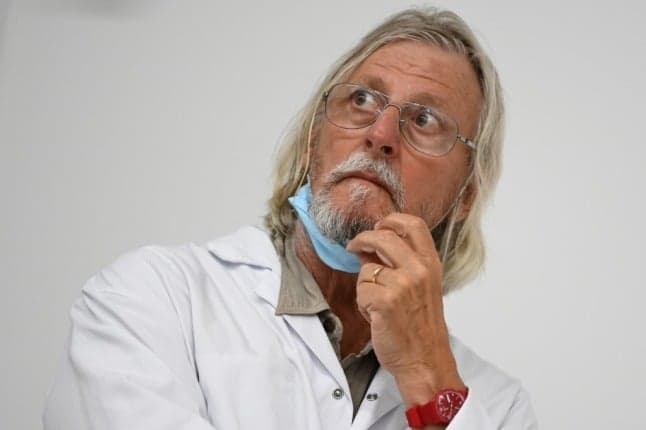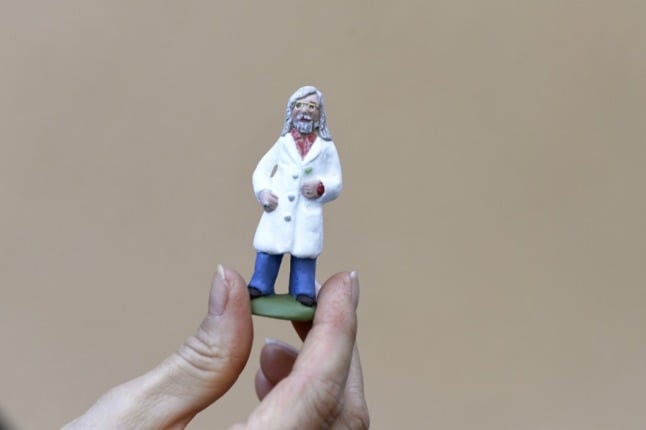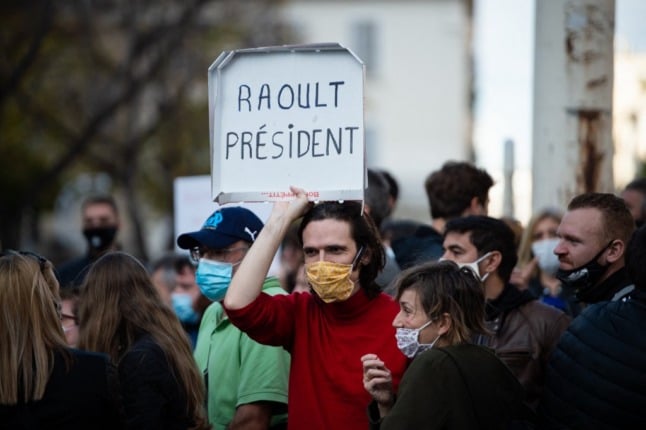Five minutes to understand: Whatever happened to French professor Didier Raoult?

He was once proclaimed as a saviour who had found the cure for Covid, but now he faces being out of a job - here's what happened to French professor Didier Raoult, who used hydroxychloroquine to treat Covid-19.
Remind me who he is?
Professor Didier Raoult is a microbiologist and head of the IHU Méditerranée, which specialises in infectious diseases.
Back in March 2020, at the very beginning of the pandemic when hospitals around the world were filling up with patients with a largely unknown illness, he claimed that he had discovered that hydroxychloroquine could cure patients who were seriously ill with the virus.

Professor Raoult merchandise from 2020. Photo by NICOLAS TUCAT / AFP
This was obviously very good news - it was the first time that anyone had suggested a cure and hydroxychloroquine was already on the market as an anti-malaria drug so could be produced cheaply and in large amounts.
These claims attracted great interest, even more so when then US president Donald Trump backed his cure.
But as I recall the pandemic didn't end in March 2020?
No. Professor Raoult made the announcement following a study he had conducted on patients at Marseille's hospital, and at that time his research had not been peer-reviewed or published.
Almost immediately other doctors, many of whom had also been experimenting with commonly available drugs including anti-malaria medication and HIV and Ebola drugs, cast doubt on his results.
Further large-scale studies of hydroxychloroquine conducted under test conditions showed that patients given hydroxychloroquine did no better than those given other drugs.
So that was the end of it?
Far from it. Professor Raoult stuck to his guns and what started as a dispute over results of a drugs trial went down some very unexpected avenues including the age-old conflict between Marseille and Paris.
Prof Raoult had long proclaimed himself as an outsider to the medical 'establishment' and had set up the institute in Marseille in order to be away from what he regarded as the stifling conformity of the medical community in Paris.
He insisted that a deadly pandemic was no time to conduct randomised trials and that if doctors believe a drug works they have a moral duty to give it to patients, rather than a placebo. Others disagreed and said that progress could only be made with properly controlled studies of medication.
He became something of a local hero in Marseille, which is always fond of sticking two fingers up at the capital, and his struggles against 'the establishment' saw him adopted as a figurehead by many anti-authority and conspiracy theory movements.

A demonstrator at an anti-lockdown protest in Marseille holds up a 'Raoult for president' sign. Photo by CLEMENT MAHOUDEAU / AFP
Over the past 18 months he has also questioned lockdowns, predicted the imminent end of the pandemic, minimised the seriousness of the delta variant of Covid and questioned the vaccination programme.
Why are we talking about him now?
Because he faces losing both his jobs.
This isn't, however, as a direct result of his activities since March 2020 but rather more prosaically because of his age.
Having turned 69, he has reached retirement age for an academic, which means the end of his functions as an academic at Aix-Marseille university and a practitioner at Marseille University Hospital in September.
The IHU Méditerranée, which he helped found, is a slightly different case. It does not have a mandatory retirement age but two board members have used the occasion of his retirement to call for tenders to replace him at the head of the institute.
The job advert rather pointedly calls for "a legitimate, charismatic researcher who is recognised by his or her peers in the field of infectious diseases".
What is the reaction to his departure?
The professor has set himself up as a "scientific guarantor of the anti-vaccine, anti-health passport discourse", and "feeds the conspiracy sphere", Marseille hospital director François Crémieux told Le Monde, adding that his presence at the head of a renowned medical research institute therefore raises questions.
Requests by Prof Raoult to extend his contract at the Institute have been turned down.
His supporters, on the other hand, are furious, seeing this as yet another plot of 'the establishment' against their hero. The hashtag #TouchePasARaoult (Don't touch Raoult) has been trending on Twitter, propelled in particular by the right-wing politician Florian Phillipot who has emerged as one of the leaders of the anti-health passport movement.
♦️Ils veulent virer le Pr Raoult !
Utilisateurs de Twitter : mettez au plus vite #TouchePasARaoult en TT !
➡️ Résister : https://t.co/xJzC5MiWYV 🇫🇷 pic.twitter.com/0fNCRBW89P
— Perle (@veritebeaute) August 18, 2021
Did anyone ever find a cure for Covid?
Not really. As time went on and more was discovered about the illness doctors have been better able to treat it and people who end up in intensive care with it now have a better chance of survival than they did at the start of the pandemic, but people continue to die every day from the illness.
That is why the focus has largely shifted to vaccines, which dramatically lower the risk of contracting the illness in the first place and, if you do get it, greatly reduce the risk of developing the most serious symptoms.
I notice the French covid tracker app has added an interesting snippet (albeit with a time lag in the data) - number of vaccinated v unvaccinated admissions to intensive care with Covid 💉 pic.twitter.com/bQJdUF5HbN
— Emma Pearson (@LocalFR_Emma) August 18, 2021
Around 85 percent of Covid patients who end up in ICU are unvaccinated.
For an in-depth look at the rise and fall of Prof Raoult, we recommend this long read by Paris-based journalist Katy Lee.
Comments (1)
See Also
Remind me who he is?
Professor Didier Raoult is a microbiologist and head of the IHU Méditerranée, which specialises in infectious diseases.
Back in March 2020, at the very beginning of the pandemic when hospitals around the world were filling up with patients with a largely unknown illness, he claimed that he had discovered that hydroxychloroquine could cure patients who were seriously ill with the virus.

This was obviously very good news - it was the first time that anyone had suggested a cure and hydroxychloroquine was already on the market as an anti-malaria drug so could be produced cheaply and in large amounts.
These claims attracted great interest, even more so when then US president Donald Trump backed his cure.
But as I recall the pandemic didn't end in March 2020?
No. Professor Raoult made the announcement following a study he had conducted on patients at Marseille's hospital, and at that time his research had not been peer-reviewed or published.
Almost immediately other doctors, many of whom had also been experimenting with commonly available drugs including anti-malaria medication and HIV and Ebola drugs, cast doubt on his results.
Further large-scale studies of hydroxychloroquine conducted under test conditions showed that patients given hydroxychloroquine did no better than those given other drugs.
So that was the end of it?
Far from it. Professor Raoult stuck to his guns and what started as a dispute over results of a drugs trial went down some very unexpected avenues including the age-old conflict between Marseille and Paris.
Prof Raoult had long proclaimed himself as an outsider to the medical 'establishment' and had set up the institute in Marseille in order to be away from what he regarded as the stifling conformity of the medical community in Paris.
He insisted that a deadly pandemic was no time to conduct randomised trials and that if doctors believe a drug works they have a moral duty to give it to patients, rather than a placebo. Others disagreed and said that progress could only be made with properly controlled studies of medication.
He became something of a local hero in Marseille, which is always fond of sticking two fingers up at the capital, and his struggles against 'the establishment' saw him adopted as a figurehead by many anti-authority and conspiracy theory movements.

Over the past 18 months he has also questioned lockdowns, predicted the imminent end of the pandemic, minimised the seriousness of the delta variant of Covid and questioned the vaccination programme.
Why are we talking about him now?
Because he faces losing both his jobs.
This isn't, however, as a direct result of his activities since March 2020 but rather more prosaically because of his age.
Having turned 69, he has reached retirement age for an academic, which means the end of his functions as an academic at Aix-Marseille university and a practitioner at Marseille University Hospital in September.
The IHU Méditerranée, which he helped found, is a slightly different case. It does not have a mandatory retirement age but two board members have used the occasion of his retirement to call for tenders to replace him at the head of the institute.
The job advert rather pointedly calls for "a legitimate, charismatic researcher who is recognised by his or her peers in the field of infectious diseases".
What is the reaction to his departure?
The professor has set himself up as a "scientific guarantor of the anti-vaccine, anti-health passport discourse", and "feeds the conspiracy sphere", Marseille hospital director François Crémieux told Le Monde, adding that his presence at the head of a renowned medical research institute therefore raises questions.
Requests by Prof Raoult to extend his contract at the Institute have been turned down.
His supporters, on the other hand, are furious, seeing this as yet another plot of 'the establishment' against their hero. The hashtag #TouchePasARaoult (Don't touch Raoult) has been trending on Twitter, propelled in particular by the right-wing politician Florian Phillipot who has emerged as one of the leaders of the anti-health passport movement.
♦️Ils veulent virer le Pr Raoult !
— Perle (@veritebeaute) August 18, 2021
Utilisateurs de Twitter : mettez au plus vite #TouchePasARaoult en TT !
➡️ Résister : https://t.co/xJzC5MiWYV 🇫🇷 pic.twitter.com/0fNCRBW89P
Did anyone ever find a cure for Covid?
Not really. As time went on and more was discovered about the illness doctors have been better able to treat it and people who end up in intensive care with it now have a better chance of survival than they did at the start of the pandemic, but people continue to die every day from the illness.
That is why the focus has largely shifted to vaccines, which dramatically lower the risk of contracting the illness in the first place and, if you do get it, greatly reduce the risk of developing the most serious symptoms.
I notice the French covid tracker app has added an interesting snippet (albeit with a time lag in the data) - number of vaccinated v unvaccinated admissions to intensive care with Covid 💉 pic.twitter.com/bQJdUF5HbN
— Emma Pearson (@LocalFR_Emma) August 18, 2021
Around 85 percent of Covid patients who end up in ICU are unvaccinated.
For an in-depth look at the rise and fall of Prof Raoult, we recommend this long read by Paris-based journalist Katy Lee.
Join the conversation in our comments section below. Share your own views and experience and if you have a question or suggestion for our journalists then email us at [email protected].
Please keep comments civil, constructive and on topic – and make sure to read our terms of use before getting involved.
Please log in here to leave a comment.